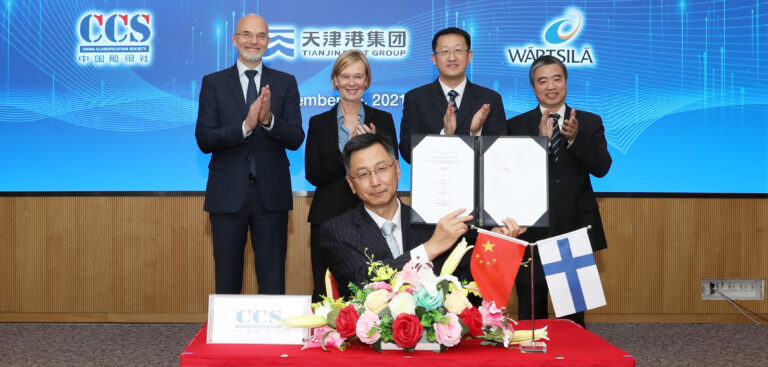Wärtsilä Voyage has signed an MoU with the China Classification Society (CCS) and Tianjin Port to advance China’s intelligent vessel technology and deploy next-generation tugboat technology. The project’s scope includes delivering advanced situational awareness technology and digital simulators to enhance and expedite vessel concept testing – including intelligent, autonomous algorithm testing, training and safety. The next-generation intelligent tugboat is expected to begin operation in the fourth quarter of 2023.
The larger aim of the partnership is to enhance safety, productivity and efficiency in China’s ports, using intelligent vessel and smart sensor technology. Wärtsilä Voyage will also contribute to and support CCS in developing intelligent vessels standards and guidelines for domestic vessels.
“The signing of this MoU is incredibly significant as it elevates our relationship with CCS and Tianjin Port Group from a traditional supplier-customer relationship and toward a deeper and long-term strategic partnership,” said Sean Fernback, president, Wärtsilä Voyage and executive vice president, Wärtsilä. “Considering the Port of Tianjin is one of the top 10 busiest ports in the world, as well as its strategic importance in China’s shipping scape, this is an excellent pilot case which opens many other opportunities for collaborations in the region.”
China and Finland jointly endorse the project under the China-Finland Science and Technology Innovation Cooperation MoU, and the China-Finland Flagship Project on Science and Technology Innovation Cooperation Strategy, 2019-2023. The MoU was virtually signed on 25 November 2021 in the presence of the dignitaries from the Ambassador of Finland to China and the Ministry of Transportation, People’s Republic of China.
Seven of the 10 busiest ports in the world are in China. Increasing traffic, congestion, the unpredictability of weather conditions and emissions have become major challenges for ports worldwide. During the pandemic, vessels in Asia had a waiting time of five to seven days. This has encouraged ports to adopt innovative technologies to help mitigate delays and disruptions. Tianjin Port has stayed at the forefront of such technological innovations, becoming the world’s first port to get approval for an autonomous driving demonstration zone with 25 unmanned electric trucks, and recently unveiling a smart zero-carbon terminal.
“This project complements our larger vision of safer and more sustainable port operations, and also gives us the opportunity to explore further collaborations to enhance our smart port services in the future,” said Yang Jiemin, vice president, Tianjin Port Group.



